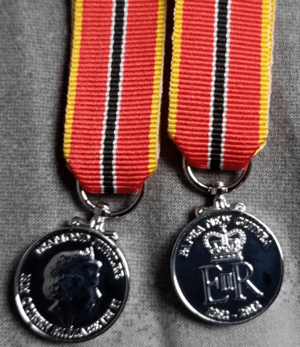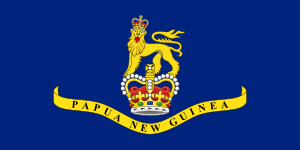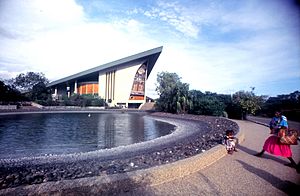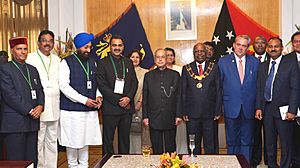Monarchy of Papua New Guinea facts for kids
Quick facts for kids King of Papua New Guinea |
|
|---|---|

Emblem of Papua New Guinea
|
|
| Incumbent | |
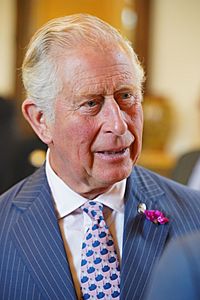 |
|
| Charles III since 8 September 2022 |
|
| Details | |
| Style | His Majesty |
| Heir apparent | William, Duke of Cambridge |
| First monarch | Elizabeth II |
| Formation | 16 September 1975 |
| Residence | Government House, Port Moresby |
The monarchy of Papua New Guinea is a system of government in which a hereditary monarch is the sovereign and head of state of Papua New Guinea. The current monarch, since 9 September 2022, is King Charles. Although the person of the sovereign is equally shared with 14 other independent countries within the Commonwealth of Nations, each country's monarchy is separate and legally distinct. As a result, the current monarch is officially titled the King of Papua New Guinea and, in this capacity, he and other members of the Royal Family undertake public and private functions domestically and abroad as representatives of the Papua New Guinean state. However, the King is the only member of the Royal Family with any constitutional role. The King lives predominantly in the United Kingdom and, while several powers are the sovereign's alone, most of the royal governmental and ceremonial duties in Papua New Guinea are carried out by the King's representative, the governor-general.
The responsibilities of the sovereign, and of the governor-general, under the Papua New Guinean constitution, include summoning and dismissing parliament, calling elections, and appointing governments. Further, Royal Assent or the royal sign-manual are required to enact laws, letters patent, and orders in council. But the authority for these acts stems from the country's populace, in which sovereignty is vested, and the monarch's direct participation in any of these areas of governance is limited, with most related powers entrusted for exercise by the elected and appointed parliamentarians, the ministers of the Crown drawn from amongst them, and judges.
Contents
History
The British protectorate of the Territory of Papua along the south coast of New Guinea and adjacent islands was proclaimed in 1884. After being fully annexed into the British Empire in 1888, the territory was placed in 1902 under the authority of the Crown in its Australian parliament and council. The northern area of New Guinea was a territory of the imperial German Crown until Australia seized the area during the First World War. After the Second World War, the Territory of Papua and New Guinea was established as a United Nations trust territory administered by Australia. Independence from Australia was granted in 1975.
Road to independent monarchy
Initially, it was expected that Papua New Guinea would adopt a republican constitution on independence, but later Papua New Guinean parliament invited Queen Elizabeth II to be their sovereign and head of state.
Papua New Guinea became independent on 16 September 1975, having been under Australian administration for the previous 60 years, but Papua New Guinean ministers decided that the country still wanted a monarch as its head of state. Papua New Guinean ministers noted the affection the people had for the Queen when she last visited in 1974. They wanted a politically-neutral head of state who could provide unity and continuity, and the government wanted to retain all the traditional knighthoods and decorations.
On 15 August 1975, the Assembly of Papua New Guinea formally adopted the Constitution, invited Queen Elizabeth II to be head of state and asked her to accept Parliament's nomination of John Guise as Governor-General of Papua New Guinea. And she "graciously consented".
The Papua New Guinean Crown and its aspects
The sovereign's role as monarch of Papua New Guinea is distinct to his or her position as monarch of any other realm, including the United Kingdom.
This division is illustrated in a number of ways: The monarch, for example, holds a unique Papua New Guinean title. Further, when he and other members of the Royal Family are acting in public specifically as representatives of Papua New Guinea, they will use, where possible, Papua New Guinean symbols, including the country's national flag. The sovereign similarly only draws from Papua New Guinean coffers for support in the performance of his duties as the monarch of Papua New Guinea; citizens do not pay any money to the King or any other member of the Royal Family, either towards personal income or to support royal residences outside of Papua New Guinea. Normally, tax money pay only for the costs associated with the governor-general as an instrument of the King's authority, including travel, security, residences, offices, ceremonies, and the like.
Constitutional role
Papua New Guinea shares equally the same monarch with fourteen other monarchies (a grouping, including Papua New Guinea, known as the Commonwealth realms) in the 56-member Commonwealth of Nations. Despite sharing the same person as their respective national monarch, each of the Commonwealth realms—including Papua New Guinea—is sovereign and independent of the others.
The monarchy of Papua New Guinea exists in a framework of a parliamentary representative democracy.
Unlike in most other Commonwealth realms, sovereignty is constitutionally vested in the citizenry of Papua New Guinea and the preamble to the constitution states "that all power belongs to the people—acting through their duly elected representatives". The monarch has been, according to section 82 of the constitution, "requested by the people of Papua New Guinea, through their Constituent Assembly, to become [monarch] and head of State of Papua New Guinea" and thus acts in that capacity. The document thereafter sets out the role and powers of the monarch.
Only Papua New Guinean ministers of the Crown can advise the sovereign on matters of the Papua New Guinean state. The monarch is represented by the governor-general of Papua New Guinea, who is nominated by the National Parliament of Papua New Guinea.
Government
As a constitutional monarch, the King acts entirely on the advice of Papua New Guinean Ministers of the Crown.
Most of the King's domestic duties are performed by the governor-general, his representative in Papua New Guinea. There are also a few duties which must be specifically performed by, or bills that require assent by the King. These include: signing the appointment papers of governors-general, the confirmation of awards of honours, and approving any change in his title. It is also possible that if the governor-general decided to go against the prime minister's or the government's advice, the prime Minister could appeal directly to the monarch, or even recommend that the monarch dismiss the governor-general. No governor-general has been dismissed from office, although in 1991, Sir Vincent Serei Eri resigned from office after Prime Minister Sir Rabbie Namaliu advised Elizabeth II to dismiss him.
All executive powers of Papua New Guinea rest with the sovereign. All laws in Papua New Guinea are enacted only with the granting of Royal Assent, done by the governor-general on behalf of the sovereign. The governor-general is also responsible for proroguing, and dissolving Parliament. The opening of a session of Parliament is accompanied by the Speech from the Throne by the governor-general.
Foreign affairs
The sovereign or governor-general may negotiate and ratify treaties, alliances, and international agreements; and for this no parliamentary approval is required. However, a treaty cannot alter the domestic laws of Papua New Guinea; an Act of Parliament is necessary in such cases. The governor-general, on behalf of the King, also accredits Papua New Guinean High Commissioners and ambassadors, and receives diplomats from foreign states.
In addition, the issuance of passports falls under the Royal Prerogative and, as such, all Papua New Guinean passports are issued in the governor-general's name, the monarch's vice-regal representative.
Courts
The Papua New Guinean monarch, on the advice of the National Executive Council, can also grant immunity from prosecution, exercise the royal prerogative of mercy, and pardon offences against the Crown, either before, during, or after a trial. The exercise of the 'Power of Mercy' to grant a pardon and the commutation of prison sentences is described in section 151 of the Constitution.
Title
The monarch holds a unique Papua New Guinean title, granted by the constitution—Charles the Third, King of Papua New Guinea and of His other Realms and Territories, Head of the Commonwealth—though, the monarch is typically styled King of Papua New Guinea and is addressed as such when in Papua New Guinea or performing duties on behalf of Papua New Guinea abroad.
Colloquially, the former Queen is referred to as "Missis Kwin" and as "Mama belong big family" in the creole language of Tok Pisin.
Oath of allegiance
The oath of allegiance in Papua New Guinea is:
"I, (name), do swear that I will well and truly serve and bear true allegiance to His Majesty King Charles the Third, His heirs and successors according to law. So help me God."
Succession
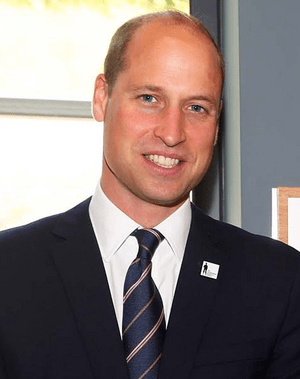
The constitution provides that the King's heirs shall succeed him as head of state. Like some realms, Papua New Guinea defers to United Kingdom law to determine the line of succession.
Succession is by absolute primogeniture governed by the provisions of the Succession to the Crown Act 2013, as well as the Act of Settlement, 1701, and the Bill of Rights, 1689. This legislation limits the succession to the natural (i.e. non-adopted), legitimate descendants of Sophia, Electress of Hanover, and stipulates that the monarch cannot be a Roman Catholic, and must be in communion with the Church of England upon ascending the throne. Though these constitutional laws, as they apply to Papua New Guinea, still lie within the control of the British parliament, both the United Kingdom and Papua New Guinea cannot change the rules of succession without the unanimous consent of the other realms, unless explicitly leaving the shared monarchy relationship; a situation that applies identically in all the other realms, and which has been likened to a treaty amongst these countries.


